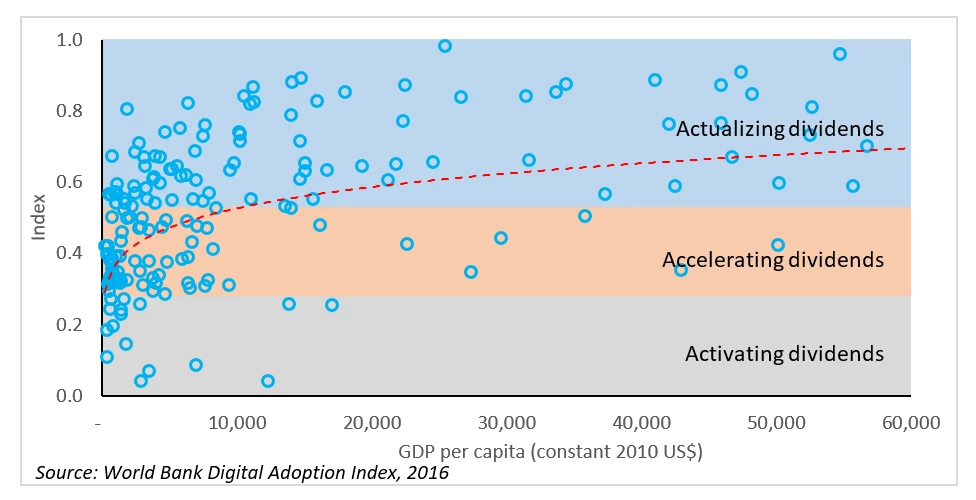 The control room at the thermal power station at Takoradi, Ghana. Photo: Jonathan Ernst/World Bank
The control room at the thermal power station at Takoradi, Ghana. Photo: Jonathan Ernst/World Bank
Countries have different levels of preparedness to significant external shocks but as the COVID-19 pandemic has shown, some are particularly disadvantaged. Not possessing the appropriate regulatory arrangements or necessary IT resources is a challenge in ensuring state continuity during large disruptions. There are some immediate steps governments can take to increase the efficacy of public officials working from home during the first phase. Looking ahead, countries will need to improve preparedness and resilience by significantly investing in information and communication technologies, and in their analog complements—stronger regulations, enhanced workers skills, and institutional accountability.
Figure 1 charts the adoption of digital technologies by governments across 179 countries and territories. This updated version of the Digital Adoption Index, initially produced for the World Development Report 2016, measures the relative levels of development of core administrative systems, online public services, and digital identification. The resulting digital divide between countries suggests different menu of options – including reforms in the immediate stage - for countries located at different levels of digital adoption.
Figure 1: Heterogenous adoption of digital technology by governments
1. Countries in the activation stage need to lay strong foundations
Countries in the early stage of activating dividends can achieve significant and quick gains through relatively easy changes. One such reform is to establish a telecommunications regulator that can ensure that the internet is safe and affordable. Increased connectivity can improve the functioning of markets, raise employment and even be a significant determinant of people's ability to self-isolate during the present pandemic. However, digital technologies can also favor natural monopolies, and are prone to anti-competitive markets and state-capture. The establishment of an effective online regulator can greatly satiate concerns for privacy and data security for citizens and help build a universal, affordable, and safe internet. As of 2018, 27 nations lacked any governing agency specifically for ICT.
Moreover, these countries can leverage the experience of other nations to leapfrog multiple stages of development. Even at low levels of GovTech, many emerging economies have greatly enhanced inclusivity, transparency, and coverage of social safety nets by instituting digital identification systems for their citizens, even in their immediate response to the pandemic. Similarly, a rapid increase in the number of cellphone subscribers and internet users in developing countries is compensating for low penetration rates of personal computers and wired tele-connectivity. This allows countries an opportunity to reap large multipliers from relatively small investments and policy revisions through e-governance allowing for increased digital interaction between citizens and front-line agencies.
2. Accelerating countries should build capable and accountable institutions
Countries already enjoying extensive internet and cellphone connectivity should leverage these advantages and invest in digital skills for civil servants, strengthen delivery systems and invest in greater transparency. Complementary investments to bolster the technical skills of public officials across bureaucracies are crucial to ensure service delivery becomes more universal, equally distributed regardless of socioeconomic status and improve development outcomes. Some have already responded by providing training for public servants to effectively work online. While automation allows for more efficient provisions of social services, technology, by itself, cannot guarantee improved accountability. The goal of digitization should be to simplify processes and systems for greater transparency when evolving from manual and paper-based systems. Kochanova, Hasnain, and Larsone (2020) and Lemieux (2016) find that e-tax filing and e-procurements, respectively, reduces costs and increases transparency only when matched with better institutional setups. Thus, governments can accelerate public sector modernization only by combining the adoption of digital technologies and efforts to strengthen institutions.
3. Countries reaping dividends should invest in deepening institutional collaboration
Other countries may already have digital solutions in place and possess a favorable regulatory infrastructure to take advantage of them. This has allowed for the systematic collection of data on their effectiveness. For example, many of these countries still witness low levels of citizen uptake in digital services. These countries should therefore focus on developing a strong set of second-generation regulations that helps breaks down silos within governmental organizations (both domestic and international). This cooperation among stakeholders and the sharing of information should act as a cornerstone of evidence-based policy making by delineating best-practices. The interplay between institutions and technology provides multiple avenues for intervention and reform. Stronger institutions allow for an easier uptake in e-governance systems, and these technologies can nudge improvements in institutional quality.
While, investing in digital connectivity may rank low on the list of priorities of some governments, countries at all stages of digital absorption can take certain decisions in the immediate and medium term to significantly reduce drag on public productivity and bolster future resilience.
Editor's note: This blog post is part of a series for the 'Bureaucracy Lab', a World Bank initiative to better understand and support the world's public officials.




Join the Conversation